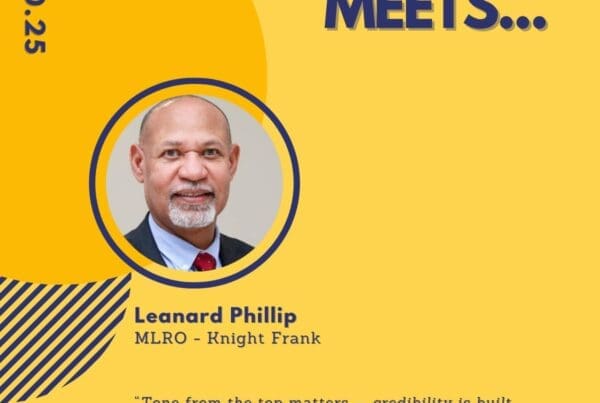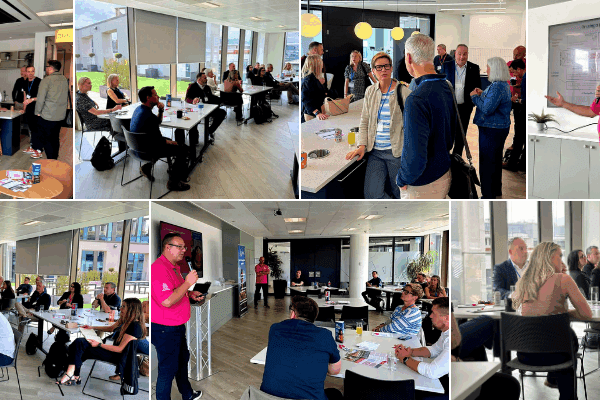MERJE Meets – a series of articles and interviews based on expert insights from a range of senior business leaders – continues with a Q&A with Alice Sweeting, soon-to-be Senior Manager – Environmental Sustainability at Yorkshire Building Society…

Alice is on the cusp of moving into the exciting new role of Senior Manager – Environmental Sustainability at Yorkshire Building Society (YBS), which prides itself on providing “real help with real life” and is the third largest organisation of its kind in the UK.
Alice is highly experienced in her field, having worked in all areas of ALM at YBS for over 10 years and climbing to Senior Manager – Model Management and Development.
Soon, she will embark on her next big challenge, a career within Environmental Sustainability with a steer towards embedding climate-focused thinking into YBS’s core business strategy.
Here we hand over to Alice, where she tells us all about life at YBS, her professional ambitions and highlights and what the future holds…
First things first, congratulations on your new environment-based role at YBS. What will be your main focus and what impact will you hope to have on the organisation/how will you demonstrate your sustainability credentials?
The role sits within Balance Sheet Management (in Finance) and is related to Environmental Sustainability. I’m only responsible for the “E” in ESG, although I’m really looking forward to working more with the Social Purpose team, who also support a lot of the work we do in this area.
My immediate focus will be recruiting the team. We will be small but perfectly formed with three people in total who will review what has been done to date, what needs to be done and what should be done. There is a lot of outwards focus in this space but it’s important to make sure that it balances with improvements internally too.
I am a keen advocate for education and development and have recently set up an internal training program to “demystify Balance Sheet Management” which has been received well across the business. I would like to build on this in the climate space to ensure the business understands not just what we need to do, but why, while embedding climate thinking into our business strategy. With this we can start to support customers and stakeholders with their climate journey.
What exactly is YBS? Can you summarise your business, its ethos and culture and what makes it unique to your competitors?
Yorkshire Building Society is in the top 10 businesses offering retail finance. As a building society we work to serve our members – the customers who deposit money with us or use us to buy their home. They are our owners and any profit we make goes into improving services for them or making us financially sustainable for the future. This is in contrast to banks, who return profit to their shareholders.
YBS expresses who we are through our three main priorities: to help people have a place to call home, to support people toward greater financial wellbeing, and to deliver lasting value to our membership over the long term. For example, over the last year, we provided savings rates 0.56% higher than the rest of the market average, which equated to a total of £198.6m back to savers. So we are really living our business purpose of real help with real life by providing market leading savings accounts.
This approach comes through in our work culture too. There is a lot of collaboration, support and openness, making it a really lovely place to work.
Can you provide a brief overview of your career to date and the journey which has resulted in the role you hold today?
I studied maths at the University of Liverpool and then wasn’t sure what career path to take. It was definitely a case of “if you can’t see it, you can’t be it” because I grew up on a farm but wanted to work in a profession. I ended up working for a logistics company looking after data in its IT department, then I went to an energy company where I discovered market risk. That led me to YBS, where I’ve been for over 11 years now.
Here, I’ve done nearly every role in ALM, including market risk, liquidity risk, modelling and hedge accounting. So, when a role as Senior Manager – Model Management and Development came up to look after ALM models as well as planning and pricing, it was the perfect role for me and an opportunity to learn how to be a leader and inspire others to enjoy modelling as much as I do.
I started that role in January 2020, so it’s had a few challenges I wasn’t expecting, but it’s been a great role.
As I move into a new role, leaving my team and a job that I love hasn’t been an easy choice but I wanted to give myself a challenge which is completely out of my comfort zone and put the skills I’ve developed over the past three years to the test.
In your capacity as Senior Manager – Model Management and Development, how has ALM, Pricing, Planning and Modelling evolved in recent years and how key is this area for regulated firms?
When I was promoted into my role it was a team of five and I’ll leave it a team of 12. That’s probably the biggest change. But with that we’ve taken on more responsibility. The team no longer focuses just on models but all automated processes in these areas. Having a standalone team who have the skill set for building automations and using new technology is beneficial for any firm, as it allows the analysts and the business thinkers to do that – knowing they can trust the numbers they receive.
As a regulated firm, we need to have confidence in our processes, particularly our data quality and data lineage and these models are used to submit information to the Prudential Regulation Authority and to set our capital and liquidity requirements. Getting this wrong can lead to us making ill-informed decisions which could impact the customer and the business, as well as submitting incorrect information to the regulator.
How has the Building Society sector adapted in the last five years to keep competing with FinTechs and rapidly diversifying markets, and what do you think the future holds?
Speaking for YBS, we are concentrating on remaining true to our purpose by rewarding member loyalty, supporting customers to improve their financial wellbeing, and helping first time buyers, home movers and downsizers find a place to call home.
As we don’t offer a current account, we need to attract customers through our products and our brand, so our core range is aimed at helping people save. Over the past year we had increased savings growth – so I think it’s working! We also launched propositions to target underserved areas of the market and are constantly looking at new ways to support customers through our propositions.
How important is it to mentor new and emerging talent to take responsibility for ESG credentials across enterprises in years to come? What advice would you give them?
I think mentoring new (and established) talent is important regardless of their focus. A lot of the work I will be doing in the new role is completely new to me and so I am looking for a mentor to support me with this.
I believe a lot of the development in this space will need to be driven by a culture shift, as positive ESG can counter a positive bottom line, which not everybody is comfortable with. It can also counter personal beliefs, which can be hard to discuss.
We’ve seen a lot of change with regards to “SG” in recent years, but “E” will potentially prove more difficult because it’s not just localised to the firm and our direct impacts. I’m not sure what advice I’d offer in this space currently as I’m still learning, but I’d start by saying, be curious and think about what it may mean, be it to a person or the environment. Could the decisions we are making have indirect impacts?
YBS embraced hybrid working long before Covid became the catalyst to this new standard way of working. What do you think the future looks like for flexible working? Is a four-day week next?
I’m really interested in where this goes. I worked from home once a week before Covid and really enjoyed having a day to myself – obviously things changed in that regard. I found I really missed the people, and the side of the desk chats you have in the office, so now by choice I’m three days a week in the office. However, when recruiting, being open to hybrid working allows for a much wider field of diverse talent.
One thing we’ve noticed though is that the networking and learning that happens in the office is much harder to reproduce remotely and a lot of our younger or newer team members prefer to be in the office so they can learn from those around them, whereas more established members of the team, or those that live further away or have families, are less likely to come in. I wonder if it’ll become circular with people choosing depending where they are on their professional and personal journeys?
So, to answer the question – I don’t know what the future holds, but we need to make sure we are still supporting and nurturing talent.
As for a four-day week – I’d love this, and personally think it could work, I’d be interested to see if any more firms take it on though.
If you could go back in time, what advice would you give to your younger self?
Oh, so much! You don’t have to do things the same way as the people who did it before you – this is probably the best advice I’ve ever had (and from a feminist POV, incredibly important when you’ve never seen someone who represents you in a senior role!).
But also, don’t be scared of failing, because you will regardless of whether you’re in or out of your comfort zone, but you will only really have fun when you’re learning new things – so give them a go! Learn what to do when things do go wrong, and it will open you up to so many more opportunities.
If you could instantaneously gain a new skill, what would it be?
To become a speed reader of technical documents and be able to digest their content. There is so much to read and understand in the ESG space, I’d love to be able to get through it quickly.
And now for our quick-fire round!
Best podcast you’ve listened to in the past 12 months?
To be honest, I don’t listen to that many podcasts as I prefer to listen to music, but I’m a big fan of Grace Dent’s Comfort Eating, where she interviews people about what they eat when they are home alone and the food that has kept them going through different stages of their lives. I find the idea of food and people’s connection to it really interesting.
Favourite way to spend a weekend?
I would love to say something cool, but truthfully, I love spending time at home to indulge in hobbies (reading, planning holidays, or sewing my own clothes) and hanging out with my partner in our local area of Leeds.
Your ultimate party trick?
Hahahaha – Probably dancing (badly) to Kate Bush’s Wuthering Heights.
A big thank you to Alice for taking the time to chat to us for this piece! If you’d like to know more about Alice and her career insights, find her on LinkedIn here. If you’d like to get involved in the MERJE Meets series or our other content, get in touch here.







